|
Govt coal imports:
How dirty is our coal supply?
By Manjula Fernando & Rukshana Rizwie
 |
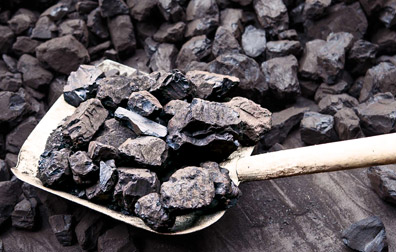 Handling
coal is a dirty business, dirty enough for another load of claims in the
latest corruption case to shake up the power and energy sector. A
Supreme Court ruling has found procedural flaws in a tender process for
the procurement of coal for the Lakvijaya Power Plant which, politicians
argue may have caused losses in millions to the Exchequer. The Hong-Kong
based raw materials company Nobel Resources Limited initially secured
the first tender in 2009 when the Lanka Coal Company and the Ceylon
Electricity Board called for bids to supply the Lakvijaya Power Plant in
Norochcholai for 2.2 million tons. Since the first bid, Nobel
monopolized the trade when it was consecutively chosen by every tender
committee for the supply of coal. Nobel won contracts to supply a total
of 4.4 million tons between 2010 and 2015. When Minister Champika
Ranawaka took over the Power and Energy portfolio, he alleged that coal
had been imported sans proper procedures and that an entrenched mafia
was to blame. Handling
coal is a dirty business, dirty enough for another load of claims in the
latest corruption case to shake up the power and energy sector. A
Supreme Court ruling has found procedural flaws in a tender process for
the procurement of coal for the Lakvijaya Power Plant which, politicians
argue may have caused losses in millions to the Exchequer. The Hong-Kong
based raw materials company Nobel Resources Limited initially secured
the first tender in 2009 when the Lanka Coal Company and the Ceylon
Electricity Board called for bids to supply the Lakvijaya Power Plant in
Norochcholai for 2.2 million tons. Since the first bid, Nobel
monopolized the trade when it was consecutively chosen by every tender
committee for the supply of coal. Nobel won contracts to supply a total
of 4.4 million tons between 2010 and 2015. When Minister Champika
Ranawaka took over the Power and Energy portfolio, he alleged that coal
had been imported sans proper procedures and that an entrenched mafia
was to blame.
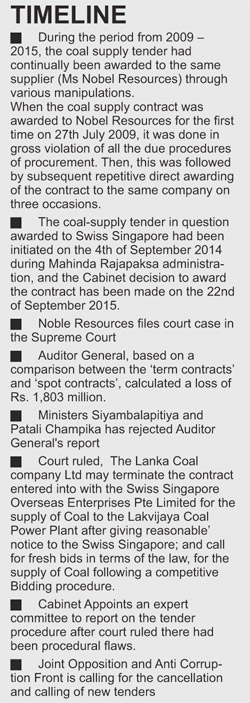
|
‘Coal war’ hots up
Who is Lanka Coal?
Lanka Coal was incorporated in 2008 for the
sole purpose of purchasing coal for Norochcholai Power Plant.
The Ceylon Electricity Board (CEB) pays Lanka Coal for the coal
it procures from suppliers.
How did it all begin? |
 |
Dr. Suren Batagoda, Secretary, Minister of Power and Energy, who was
the Secretary of the same Ministry during the coal controversy says, he
has inherited a messy tender deal. When the new government assumed
power, both, Lanka Coal and the CEB announced a Rs.50 billion tender to
supply 6.75 million tons of coal over three years. He told the Sunday
Observer, it was baffling that this tender had caused a ruckus, when it
was the only tender during the last few years to have been approved
unanimously by, the tender boards of Power and Energy Ministry, Ceylon
Electricity Board as well as Cabinet’s procurement committee and the
technical evaluation committee.
“Based on the Supreme Court ruling, we sought the advice from the
Attorney General’s Department, who suggested that we engage in
discussions with Swiss Singapore, the current company, to ponder the
possibility of cancelling this process,” he said. “We’ve held only one
meeting so far and the company declined to accept our offer. The company
cited that all necessary purchases had been made and it was not
plausible to back out.” Dr. Batagoda said, the Ministry might refer the
matter to the Cabinet next week if both parties still fail to reach an
amicable solution. “We are not concerned about the quantity of coal,
because we have 2 million tons which is sufficient. However, we will
call for at least 5 spot tenders starting next week, so that we can
avert possible shortages arising from this tender process.”
He added that the Ministry is planning on calling five spot tenders
for the supply of 330, 000 tons of coal. “In the past there have been
several instances when we’ve had to force the plant to shut down or go
slow simply because we didn’t have enough coal. This time we will make
sure it does not happen.”
Dr Batagoda said, when he realized last year that the tender awarding
procedure would cause a probable shortage, the Ministry went ahead with
spot tenders. He said, if the spot tenders had not been called then,
Lanka Coal would have continued to purchase coal from Nobel. To him,
spot tender ensured that the country didn’t run into a scarcity, and it
was the easiest way of mitigating the crisis.
Referring to a three-member committee comprised of eminent academics
who have been asked to make their observations, he said, the committee
will in no way contradict the Supreme Court ruling and will merely
ascertain if the procedural flaws cited in the ruling have led to a
loss/profit during this deal.
Prof. Lakshman Watawala and Prof K.K.Y Perera who are in the
committee declined to make a comment since the report was due the
following day. Meanwhile, a highly placed source at the Ministry of
Power and Energy told the Sunday Observer, that the committee will not
dwell much on the corruption claims but will merely highlight the
procedural flaws in the bidding process.
“We need to come clean,” he said. “We also must accept the fact that
we changed the evaluation criteria. The Ministry also requested Cabinet
approval for the evaluation and technical committee to open bids from
the other companies, which was rejected.” He added that factions within
the Power and Energy Ministry were divided in opinion over the tender
process with some calling it corrupt and flawed.
‘No fraud committed’
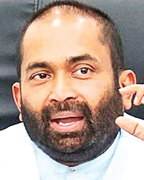 Power
and Renewable Energy Minister, Ranjith Siyambalapitiya Power
and Renewable Energy Minister, Ranjith Siyambalapitiya
“We have no intention to delay implementing the recent Supreme Court
ruling on the coal tender awarded to Swiss Singapore Overseas
Enterprises Pvt. Ltd.
It is a travesty of the truth to say, the appointment of the three
member committee is a ruse to dodge the Judgment. Besides, the court did
not rule that the tender should be cancelled immediately. It says, the
tender may be terminated after consulting the company concerned to avoid
compensation claims.
Hence, the Ministry secretary will have a round of discussion with
representatives of the Swiss Singapore Overseas Enterprises Pvt. Ltd.
The Attorney General has advised that a final decision over the
tender should be approved by the Cabinet. We have nothing to hide, the
tender process for Lakvijaya Power Plant was transparent and in keeping
with the standard norms. I totally reject accusations that the tender
caused a great deal of financial loss to the government or that it was
awarded to the highest bidder. This statement is inaccurate.
The Cabinet appointed expert committee will report if there has been
a ‘procedural flaw’ in awarding this tender.
It comprises reputed experts in the field of power generation. The
Committee report will be tabled in Parliament shortly, so that the truth
will be revealed.
I made a detailed statement in Parliament in this regard, and the
relevant documents were tabled for anyone to refer to. It was not a
transaction done in secrecy. In fact, it is the most transparent tender
procedure since the commissioning of the Norochcholai coal power station
in 2009.
If there are any doubts over the statistics, anyone is free to visit
the Ministry and examine the relevant documents. It is incorrect to say
that we offered the tender to the highest bidder, in fact, Swiss
Singapore Overseas Enterprises Pvt. Ltd had the lowest bid according to
our criteria.
During my short tenure as Power and Energy Minister, I have striven
to put the Ceylon Electricity Board (CEB) tender process in order, to
make it corruption free and competitive in all sectors of power
generation. In fact, recently we managed to close a deal to purchase 20
MW of wind power at a highly competitive price of Rs.12.20 per unit.
I totally reject that a fraud had been committed here.”
‘Attempt to continue corrupt deal’
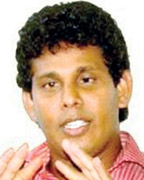 Wasantha
Samarasinghe, Anti Corruption Front: Wasantha
Samarasinghe, Anti Corruption Front:
“The Court has proved that, public funds had been misused through
this transaction. In its recent ruling the Chief Justice directed the
Power and Renewable Energy Ministry to terminate the contract and call
for fresh tenders.
What we see now is an effort by the Ministry to give different
interpretations to the SC ruling and continue this corrupt deal. Instead
of implementing the judgment, they have appointed a committee. There is
no need for another committee to probe the tender procedure, the SC
ruling is very clear.
This tender will be effective for three years. The government has
time to cancel it and go for fresh bids so that there will be no
shortage in the coal supply to the Lakvijaya power plant.
The Minister has said that due to this transaction there has not been
any loss to the country. It is a diabolical lie. If that is the case,
they should have submitted their proof to the Supreme Court during the
proceedings. Why didn’t they do that?
The Court has accepted that there has been a fraud. The Auditor
General has given his opinion that if the contract is not terminated,
the country will continue to incur losses. A similar loss was incurred
by the country due to the Hedging deal in 2007. Due to short sighted
decisions of officials, millions of public funds were wasted.
Even if the intention was to break the monopoly enjoyed by the
supplier company, they should have offered the tender to a lower bidder.
What is the point in awarding the tender to a higher bidder and
incurring losses? Is that a wise decision?”
‘Contract to Nobel was a violation’
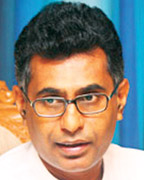 Minister
Patali Champika Ranawaka Minister
Patali Champika Ranawaka
“My observation is that the computation of the Auditor General where
he has calculated a loss of Rs. 1,803 million due to this coal deal is
incorrect. The Ministry of Power, in its calculations, has shown that no
financial loss has been incurred by not awarding the tender to Nobel
Resources International Pvt. Ltd.
According to the Ministry, the award of the tender to Swiss Singapore
Overseas Enterprises Pvt. Ltd, in preference to the unsuccessful bidder
in question, has resulted in a saving of US$ 408,458 (LKR million 59),
with no compromise on the quality of the coal supplied. It is up to the
Ministry officials to respond to the Auditor General’s calculations in
question.
Ironically, the central issue that has conveniently escaped the
attention of the critics is that during the period, 2009 – 2015, the
coal supply tender had continually been awarded to the same supplier (Ms
Nobel Resources) through various manipulations.
It should be noted that when the coal supply contract was awarded to
the said company for the first time on July 27 2009, it was done in
gross violation of all due procedures of procurement.
Then, it was followed by subsequent repetitive direct awarding of the
contract to the same company on three occasions, cancelling the
procurement process in progress on each occasion. It was I who revealed
this fraud to the nation, through my publication ‘‘Doomed economy’’
written in Sinhala, in November 2014. More importantly, not only did we
reveal the scandal, but also acted to end it.
The monopoly that prevails in the supply of coal as well as oil was
broken by the Government during its 100 day program. It was the new
‘spot contract’ system introduced, which eventually brought to an end
the massive embezzlement of public funds through an artificial scarcity
of coal and awarding the supply contract to the same tenderer. The
observation by the Auditor General indeed amounts to endorse the ‘spot
contract’ system introduced by us.” |

